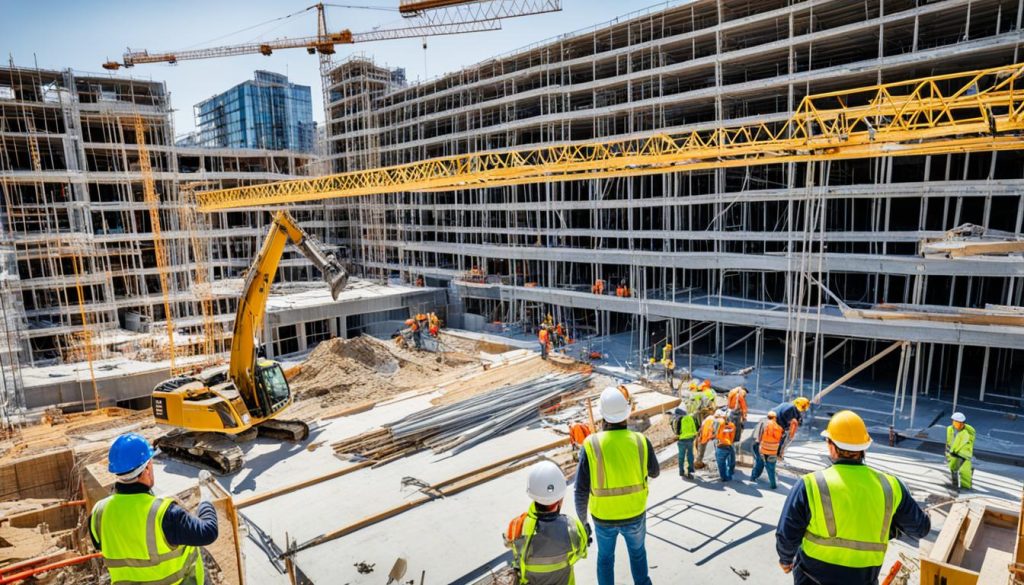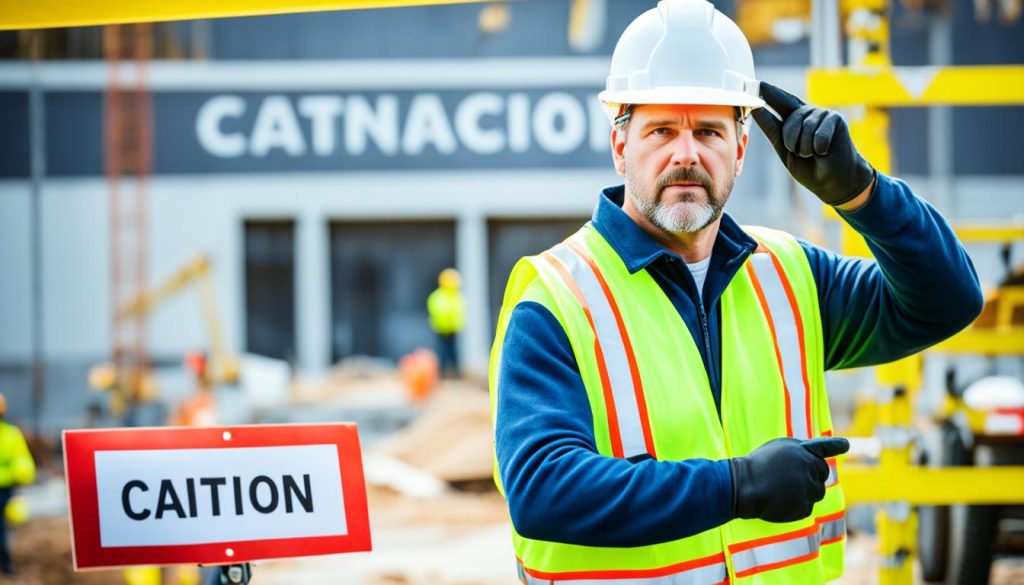Did you know that a general contractor is responsible for managing every aspect of a construction project, from start to finish? Whether it’s a residential home renovation or a large-scale commercial construction, the general contractor plays a crucial role in ensuring that the project stays on track and meets the client’s expectations.
General contractors handle project management, coordinate laborers and subcontractors, manage materials and equipment, and oversee the construction progress. Their flexibility and adaptability make them indispensable in the dynamic world of construction.
Key Takeaways:
- A general contractor oversees and manages construction projects from start to finish.
- They coordinate laborers, materials, equipment, and subcontractors.
- General contractors are responsible for submitting project proposals, managing construction work, ensuring legal and safety compliance, tracking project progress, and maintaining open communication with clients.
- Their role is dynamic, adapting to the specific requirements of each project.
- Ongoing project management, including cost estimation, progress tracking, and quality control, is crucial for successful construction projects.
Responsibilities of a General Contractor
As a general contractor, I am entrusted with a wide range of responsibilities that are crucial to the successful execution of construction projects. From project management to labor and subcontractor management, I play a pivotal role in ensuring that everything runs smoothly. Here are some of my key responsibilities:
- Construction Project Management: I take charge of planning and executing construction projects, overseeing every aspect from start to finish.
- Project Scheduling: I create and maintain a detailed project schedule, ensuring that all tasks are completed on time and in the correct sequence.
- Labor Management: I coordinate and manage the workforce, ensuring that laborers are assigned appropriate tasks and that the project progresses efficiently.
- Subcontractor Management: I hire and manage specialized subcontractors for tasks that require specific expertise, ensuring that they deliver quality work.
- Construction Site Management: I oversee the day-to-day operations at the construction site, ensuring that work is carried out safely and in compliance with local codes and regulations.
Collaboration is key in the construction industry, and I work closely with architects, designers, and various stakeholders to ensure effective communication and project coordination. By facilitating clear and open communication, I enable everyone involved to work together seamlessly towards a common goal.
My responsibilities extend beyond the construction phase as well. After the project is completed, I am responsible for collecting lien waivers and ensuring that subcontractors receive timely payment for their work.
As you can see, the role of a general contractor is multifaceted and requires a diverse skill set. Effective project management, strong communication, and meticulous attention to detail are among the qualities that enable me to successfully fulfill my responsibilities and deliver high-quality construction projects.
| Responsibility | Key Tasks |
|---|---|
| Construction Project Management | Planning, executing, and overseeing construction projects |
| Project Scheduling | Creating and maintaining a detailed project schedule |
| Labor Management | Coordinating and managing the workforce |
| Subcontractor Management | Hiring and managing specialized subcontractors |
| Construction Site Management | Overseeing day-to-day operations at the construction site |
Dynamic Role of a General Contractor
As a general contractor, I understand that the role can vary greatly depending on the complexity and scope of the construction project at hand. Each project presents unique challenges and requirements, making it essential for general contractors to be flexible and adaptable in their approach.
One of the key aspects of being a general contractor is managing project complexities. This involves handling varying construction projects with different levels of intricacy. From small residential renovations to large-scale commercial constructions, general contractors need to have the expertise and knowledge to tackle diverse project types.
Additionally, construction site requirements play a significant role in shaping the role of a general contractor. These requirements encompass a range of factors, including building permits, property securing, site surveying, workforce sizes, temporary materials, and waste disposal. General contractors must navigate and comply with these site-specific requirements to ensure smooth project execution.
The dynamic nature of a general contractor’s role requires adaptability and a keen understanding of project complexities and construction site requirements. Being able to adjust and cater to the specific needs of each project is what sets flexible and adaptable general contractors apart in the construction industry.

Importance of Ongoing Project Management
Ongoing project management plays a critical role in ensuring the success of construction projects. As a general contractor, my responsibility is to oversee every aspect of a construction project, from its inception to completion. Effective project management involves multiple key tasks, such as project proposal submission, cost estimation, progress tracking, quality control, construction site safety, and subcontractor selection.
When it comes to project proposals, I carefully outline all the project details, including labor requirements, cost estimates, scheduling considerations, and material specifications. This comprehensive proposal serves as a blueprint for the entire project and ensures that all parties involved have a clear understanding of the project scope and objectives.
Cost estimation is another crucial aspect of project management. I invest significant time and effort into accurately estimating the costs associated with the project. This includes considering factors such as labor costs, material expenses, equipment rental fees, and workers’ compensation insurance. By conducting a thorough cost estimation, I can establish an appropriate budget and minimize the risk of cost overruns.
Throughout the construction process, I closely manage the daily operations of the construction site. This involves ensuring that all construction work adheres to specifications and industry standards, maintaining a high level of quality control, and implementing robust safety measures to protect workers and the surrounding environment. Construction site safety is always a top priority, and I proactively address any potential hazards or risks to maintain a safe working environment.
Additionally, I diligently track the progress of the project and make adjustments as needed to keep the project on schedule and within budget. Effective progress tracking allows me to identify any potential delays or issues early on and take timely corrective actions to ensure the project stays on track for successful completion.
Furthermore, I play a crucial role in subcontractor selection. I carefully choose subcontractors based on their expertise, experience, and reputation, ensuring that they are best suited to complete the specific tasks required for the project. Effective subcontractor selection helps maintain the quality and efficiency of the construction work.
In summary, ongoing project management is vital for the overall success of construction projects. As a general contractor, I handle various responsibilities ranging from project proposal submission and cost estimation to progress tracking, quality control, construction site safety, and subcontractor selection. By effectively managing these aspects, I ensure the smooth progression and timely completion of construction projects.

Project Tracking and Disruption Prevention
In order to successfully complete construction projects on time, project tracking is essential. As general contractors, we take on the responsibility of monitoring the progress of the project, ensuring that it stays on track and meets all necessary requirements.
One crucial aspect of project tracking is construction progress monitoring. By regularly assessing the construction site and evaluating the work being done, we can identify any potential delays or issues that could disrupt the project timeline. This proactive approach allows us to take immediate action and implement necessary measures to prevent any disruptions.
Quality control is another area of focus during project tracking. We continuously assess the work being done to ensure that it meets the highest standards and adheres to the specified guidelines. This commitment to quality control guarantees that the final outcome of the construction project meets or exceeds our clients’ expectations.
Cost-effective construction methods play a significant role in successful project tracking. We employ efficient techniques that maximize resource utilization while minimizing unnecessary expenses. This allows us to deliver high-quality results within the agreed-upon budget, providing our clients with cost-effective construction solutions.
Material supply management is an integral part of project tracking. We carefully plan and schedule material purchases in advance, ensuring that they are readily available when needed. By effectively managing the supply chain, we prevent delays and disruptions caused by material shortages, further contributing to the smooth progression of the project.
Construction site safety is of paramount importance during project tracking. We prioritize the safety of our workers and everyone present at the construction site. Through strict adherence to safety regulations, regular inspections, and the implementation of safety protocols, we maintain a secure working environment.
Overall, project tracking enables us to stay in control of the construction project and prevent any potential disruptions. By monitoring the progress, ensuring quality control, employing cost-effective methods, managing material supply, and prioritizing construction site safety, we ensure the successful completion of our projects and the satisfaction of our clients.
| Benefits of Project Tracking |
|---|
| Keeps construction projects on schedule |
| Ensures quality control |
| Maximizes cost-effectiveness |
| Prevents delays and disruptions due to material shortages |
| Prioritizes construction site safety |
Maintaining Client Communication
As a general contractor, one of my top priorities is maintaining open and effective communication with my clients throughout the construction project. I understand that clear and consistent communication is key to ensuring a successful and satisfactory construction experience.
Throughout the project, I serve as the primary point of contact, providing regular project updates to keep clients informed about the progress and any developments. Whether it’s in person, via phone calls, or through email, I make sure to promptly address any concerns, questions, or feedback that clients may have. By actively listening and engaging with clients, I can better understand their expectations and adjust my approach accordingly.
Communication is a two-way street, which means I also encourage clients to provide their input, ideas, and feedback at every stage of the construction process. By fostering a collaborative environment, we can work together to achieve the desired outcome and ensure that the project aligns with the client’s vision.
I believe that effective client communication is crucial for both parties involved. It helps to create transparency, build trust, and mitigate any potential misunderstandings. By maintaining open lines of communication, I can address any challenges or issues that may arise proactively and find the best solutions to keep the project on track.
At every step of the way, my goal is to exceed client expectations by delivering clear and timely project updates, actively listening to their needs, and providing exceptional customer service. I believe that strong client communication is the foundation for a successful construction project.
The Role of General Contractors in Construction Projects
General contractors play a vital role in ensuring the success of construction projects through their oversight and coordination. They act as the linchpin between the property owner and all parties involved in the construction process, including suppliers, vendors, and tradespeople. With their expertise and experience, general contractors handle the project’s various moving parts, facilitating seamless progress from start to finish.
One of the key responsibilities of general contractors is project coordination. They meticulously plan, manage, and track the construction project, ensuring that all tasks are executed in a timely and efficient manner. By effectively managing subcontractors and their activities, general contractors maintain smooth operations throughout the project, preventing delays or conflicts that could impact the project’s timeline or budget.
Furthermore, general contractors play an integral role in construction project completion. They ensure that the project meets all legal requirements and complies with building codes and regulations. Additionally, general contractors prioritize safety on-site, implementing measures to safeguard both workers and the surrounding environment. By overseeing the final stages of construction, general contractors guarantee a high-standard finish that aligns with the client’s expectations.
The importance of construction contractors in the industry cannot be overstated. Their project oversight, coordination, and subcontractor management contribute significantly to the overall success of construction projects. By partnering with a skilled and experienced general contractor, property owners can confidently navigate the complexities of construction, leading to the realization of their vision.

Leave a Reply
You must be logged in to post a comment.